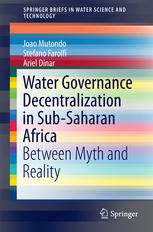

Most ebook files are in PDF format, so you can easily read them using various software such as Foxit Reader or directly on the Google Chrome browser.
Some ebook files are released by publishers in other formats such as .awz, .mobi, .epub, .fb2, etc. You may need to install specific software to read these formats on mobile/PC, such as Calibre.
Please read the tutorial at this link: https://ebookbell.com/faq
We offer FREE conversion to the popular formats you request; however, this may take some time. Therefore, right after payment, please email us, and we will try to provide the service as quickly as possible.
For some exceptional file formats or broken links (if any), please refrain from opening any disputes. Instead, email us first, and we will try to assist within a maximum of 6 hours.
EbookBell Team

4.4
22 reviewsThis book is about the process of water management decentralization in African countries, which is seen as a means of advancing river basin management at the lowest appropriate level.
There are very different stages of implementing decentralization in practice. This called for research aiming to understand the following questions: (i) why do some water agencies succeed more than others? (ii) What are the variables involved in such reform process? (iii) which variables have a positive or a negative impact on the implementation of decentralization processes? (iv) Which variables could be affected by policy interventions, and how? This study aimed to answer these questions through the following objectives: (i) analyze the factors that have potentially affected the results of decentralization process in SSA basins, and (ii) analyze the performance of decentralization process in SSA basins. Qualitative and quantitative approaches were used.
The main findings are that water scarcity is a major stimulus to reform; water user associations, if not well prepared and trained, may deter the decentralization process; and being part of an existing treaty over an international basin helps foster the process. Conditions improving decentralization performance include: scarcity of water resources, longer period of implementation, bottom-up creation, and appropriate budgetary support.